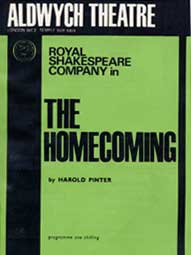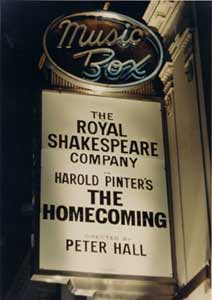
Programme Cover |
The Homecoming, Royal Shakespeare
Company, Aldwych Theatre, London, 3rd June 1965, and
transferred to the Music Box theatre, New York
Max - Paul Rogers
Lenny - Ian Holm
Sam - John Normington
Joey - Terrence Rigby
Ruth - Vivien Merchant
Teddy - Michael Bryant
Directed by Peter Hall
Desgin and lighting - John Bury
Assistant Director - Trevor Nunn
Achievement from a tightrope
Penelope Gilliatt
The opening of Harold Pinterís The Homecoming (Aldwych) was
an exultant night. Quite apart from the extraordinary experience
of seeing a modern play produced in a style as special and achieved
as the best we do for Shakespeare, it offered the stirring spectacle
of a man in total command of his talent.
Pinterís technique must be a fiend to control. In his TV play The
Tea Party I was a afraid it was slipping into vulgarity and
hollowness. The new full-length play pulls back from the brink:
its fastidiousness is practically impeccable, and the ideas in it
are solid as boulders.
ëItís a question of how much you can operate on things, not
in things,í says the character played by Michael Bryant;
ëI mean itís a question of keeping a balance between the two.í This
is on of the notions that Pinterís conflicts stem from. There are
people who can only operate in things, like the name-character
in The Caretaker and people who can only operate on
things, like the name-character in The Servant; in situations
where they are incapable of keeping a balance they are thrown into
fear and fury. The inch-by-inch fighting that makes up the matter
of Pinterís plays is never to gain the points that are openly declared.
It comes out of a mutually murderous mood between a man who feels
himself to be floundering in a swamp and a man who loathingly sees
himself to be keeping his feet dry.
Monotone set
In The Homecoming there are five men in the family. Mum
is dead. Their home is a vast open-plan North London living-room,
working class tat in epic concrete: a magnificent structure by John
Bury, furnished with a Welsh dresser painted Berlin-black and a
smoky-cut armchair. The whole thing is in monotone blacks and greys,
the colours of mashed newspapers and cigarette ash and old socks.
Uncle Sam (John Normington), who holds the reins of the kitchen,
is a diluted man who works as a chauffeur and has some dim sense
of importance about taking his bosses to London airport. Dad is
a retired butcher, played by Paul Rogers with a perfect grasp of
the fact that half of the grating comic power of the dialogue comes
from speaking a line against its surface meaning, roaring hatred
when demanding a hug or vilifying his puny life when his words are
apparently boasting about it.
Enraging effect
The two sons at home are a beefwit demolition expert who boxes
in his spare time and a neat lad who turns out to be a pimp, played
by Ian Holm with dapper and glinting ferocity. The visiting son,
Michael Bryant, doctor of philosophy, a cut above them and equipped
with a rilingly sexy wife played by Vivien Merchant. Like the pimp,
their habit of character is to operate on things, and their effect
on the three who operate in things is enraging and hideous.
The drama in The Homecoming is not the plot. In Pinter it
never is. It consists in the swaying of violent people as they gain
minute advantages. A man who does the washing-up has the advantage
over a man sitting in an armchair who thinks he can hear resentment
in every swilling tea-leaf. The member of a married couple who stays
up late has the advantage over the one who goes to bed first. A
father has the advantage over his children as long as he can make
them think of their birth and not let them remind him of his own
death: the sons are condemned to ruminate interminably about what
happened ëthe night they were made in the image of those two people,
at it.í

Pinter on Broadway
|
Pinter must stylise more than any writer in England
apart from Ivy Compton-Burnett, which is why Peter Hall is right
to direct the play so anti-naturalistically. His people are entirely
creatures of his manoeuvre, hence the peculiar freezing mood of
their moments of randiness. The sexual instinct in Pinter isnít
at all emotional or even physical; it is practically territorial.
There is one woman in The Homecoming, his recurring character
of a tarty bourgeois wife who contemplates promiscuity as evenly
as if she were counting her dollies, and she looks on her body rather
as a landlord would look on a corner site; the moment she has apparently
been exploited sexually, she really has the advantage because she
owns the property.
If the second half of the play seems a shade undernourished, I think
this is the effect of Pinterís vision and not a fault of technique.
His cold, indifferent eye is essential to the tone ñ without it
the play could never be so funny, nor preserve itself from the crevasses
of patronage and sentimentality that there are on either side ñ
but it obviously has its dangers with audiences who demand to be
ëmovedí and ëinvolvedí.
Uniquely comic
Given the prescribed limits of the play I doubt if it could
have been better achieved. The understanding of the way we use language
is uniquely comic, provoking pity without expressing it, and the
implicit assumption that a play is concerned only with what is disputable
is a very honourable one; if anything The Homecoming could
do with even fewer ascertainable facts, not more.
The Observer, 6th June 1965
The production transferred to the Music Box Theatre,
West 45th Street, New York City, with the same cast excepting the
role of Teddy. Michael Bryant was replaced by Michael Craig
|



